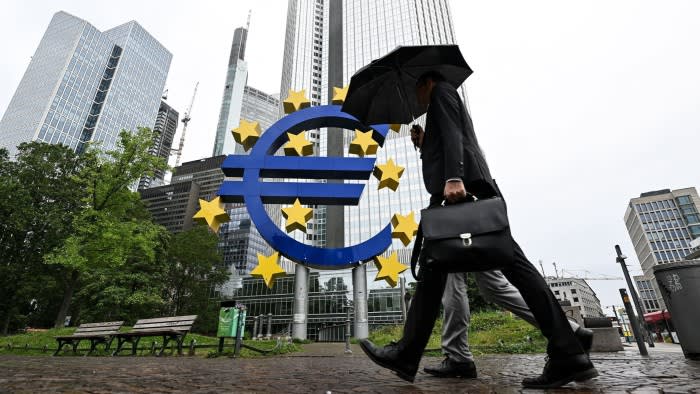Unlock Editor’s Roundup for free
Roula Khalaf, editor of the FT, selects her favorite stories in this weekly newsletter.
Eurozone inflation rose for the first time this year, adding to concerns about how slowly the European Central Bank will cut interest rates if price pressures remain high.
The 2.6 percent rise in consumer prices across the single currency area in the year to May was up from 2.4 percent in the previous month and slightly above the level forecast by economists in a Reuters poll.
Core inflation – which strips out energy and food to give an idea of underlying price pressures – accelerated from 2.7 percent to 2.9 percent, in a worrying sign for investors who hope the ECB will cut interest rates aggressively. this year.
Until this month, eurozone inflation had slipped gently towards the ECB’s 2 percent target for the year, allowing policymakers to signal clearly that they expect to start cutting their key deposit rate from a record high of 4 percent next week.
Germany’s 10-year bond yield — a benchmark for borrowing costs in the eurozone — jumped to 2.7 percent in response to Friday’s data, its highest level in more than six months.

The ECB is still widely expected to go ahead with next week’s rate cut – which would make it the first major central bank to ease monetary policy since the biggest rise in inflation for a generation that began three years ago.
But with price pressures rising again this month and the Eurozone economy returning to growth in the first quarter, investors expect the ECB to adopt a more cautious approach to rate cuts for the rest of this year.
Jack Allen-Reynolds, an economist at Capital Economics, said rising Eurozone inflation “will not stop the ECB from cutting interest rates next week. But another reduction in July now seems impossible.”
The ECB’s chief economist, Philip Lane, told the Financial Times earlier this month that “barring any major surprises”, the central bank is likely to lift the highest level of tightening at its meeting next week in Frankfurt .
He said the pace of further cuts would depend on the path of core inflation and the level of demand, which he warned was likely to be “bumpy and gradual”.
Some policymakers have warned that higher inflation readings will make the ECB less likely to make a successive cut in July. Markets are estimating between two and three rate cuts of 0.25 percentage points this year.
The ECB expects wage growth in the Eurozone to moderate from record highs and for companies to absorb higher labor costs by compressing profit margins rather than passing them on to consumers through price hikes.
This will be key in determining how quickly inflation in the labor-intensive services sector declines this year. Eurozone services inflation rose to a seven-month high of 4.1 percent in May, up from 3.7 percent a month earlier.
However, some economists see single factors behind the recent rise in utility inflation, including the earlier timing of Easter this year – which usually causes higher prices in April to fall in May – and the ticket’s fading disinflationary impact. Germany’s free public transport that was launched. one year ago.
“The increase in utility price inflation is not a welcome development,” said Diego Iscaro, an economist at S&P Global, adding that he would wait for detailed data to show “whether the end of German transport subsidies was the main culprit or if there were other factors that increase the prices of services”.
There are signs that consumers remain cautious despite their purchasing power being boosted by wages rising faster than inflation this year. German retail sales fell 1.2 percent in April from a month earlier, separate figures showed on Friday, while French retail sales fell 0.8 percent in the same period.
